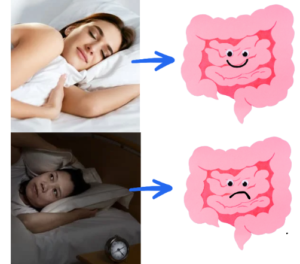Exploring the Essential Link Between Quality Sleep and Digestive Health
Sleep is not merely a period of rest; it serves as a vital biological function that significantly influences our digestive health. The complex relationship between sleep and digestion involves various physiological processes that operate in harmony. The body's circadian rhythm, often termed the internal body clock, aligns both sleep cycles and digestive functions, highlighting the body's innate ability to maintain a schedule. This synchronisation is particularly noticeable in the regularity of hunger cues, which occur at similar times each day, showcasing how our biological systems adapt to natural cycles.
Maximising Digestive Health Through Quality, Restorative Sleep 
Sleep is crucial for the body's capacity to heal, rejuvenate, and restore its various systems. The deeper stages of sleep are particularly essential for these restorative processes. During these profound phases, the organs, tissues, and cells comprising the digestive system not only relax but also engage in vital repair mechanisms. The body prioritises cellular repair and regeneration during deep sleep, particularly concerning the renewal of cells lining the digestive tract. Given that these cells are subject to continuous wear from food particles and digestive enzymes, their regeneration is pivotal for maintaining the integrity of the gastrointestinal lining, ultimately enhancing the efficiency of digestion.
Deep sleep is also vital for fortifying the immune system, particularly within the digestive system, which is home to specialised immune cells activated by the beneficial bacteria inhabiting the gut. These immune cells are crucial in protecting both the gut and the entire digestive system from harmful microorganisms, thereby ensuring a balanced bacterial population within the gut ecosystem, essential for optimal health.
Moreover, the organs within the digestive system play a critical role in detoxification, facilitating the removal of waste and harmful substances from the body. Deep sleep significantly enhances this detoxification process by optimising the efficiency of the liver and kidneys, ensuring these organs operate at their peak performance. This synergistic connection between sleep and detoxification is vital for promoting overall digestive health and wellness, emphasising the necessity of restorative sleep.
Uncovering the Impact of Sleep Patterns on Gut Motility
A fundamental aspect of digestion involves the effective movement of food and waste through the digestive tract, a process known as gut motility. This process experiences substantial changes during sleep. Throughout both deep and light stages of sleep, the rate of gut motility considerably decreases. This reduction is a necessary adaptation that allows the digestive system to conserve energy, which is then redirected towards repairing digestive tissues. By conserving energy in this manner, the digestive process is optimised for peak efficiency during waking hours, further enhancing nutrient absorption and waste elimination.
The migrating motor complex consists of a series of contractions that occur during fasting periods, including during sleep. This cycle is vital for gut motility, as it effectively eliminates food particles and residue that may accumulate in the digestive system. This natural cleansing mechanism of the digestive tract reduces the risk of bacterial overgrowth, fostering a healthy gut environment. Significantly, the migrating motor complex is most actively engaged during the night when individuals are fasting and asleep, underscoring the essential role of sleep in safeguarding the health of the digestive system.
As dawn breaks, gut motility gradually increases, preparing the digestive system to efficiently process and digest food. This rise in motility can also stimulate the first bowel movement of the day, exemplifying the finely tuned interplay between sleep and gut motility. Understanding this connection is crucial for optimising digestive health and enhancing overall well-being.
Examining Hormonal Interactions That Influence Sleep and Digestion
Ghrelin, widely known as the hunger hormone, plays a crucial role in stimulating appetite, while leptin signals to the brain when the stomach is full, helping to avert overeating. Together, these hormones are fundamental to appetite regulation, but their functions can be adversely affected by insufficient sleep, leading to imbalances that disrupt normal eating behaviours.
Even a single night of inadequate sleep can result in elevated levels of ghrelin, which can increase appetite and frequently trigger cravings for carbohydrates. This phenomenon is often described as feeling ‘hangry’. Compounding this issue, leptin levels may drop after a night of poor sleep, disrupting the signals that indicate fullness. This creates a challenging scenario where individuals may overeat and struggle to recognise their body's natural cues to stop eating. While occasional poor sleep may not lead to severe consequences, chronic insomnia can result in significant digestive issues, including gut inflammation, liver disorders, gastroesophageal reflux disease, inflammatory bowel disease, and even colorectal cancer, alongside contributing to unwanted weight gain.
Understanding the Consequences of Sleep Disruption on Digestive Health
Disruptions to sleep can lead to a myriad of digestive issues. Factors such as shift work, especially night shifts, and the experience of jet lag can significantly disturb sleep patterns, throwing the body's internal clock out of sync. Additionally, consuming food late at night or maintaining irregular meal times can adversely influence the quality of sleep. The circadian rhythm that governs sleep is intrinsically linked to natural sunlight, which plays a crucial role in sustaining a healthy sleep-wake cycle.
Unfortunately, in our modern, technology-driven society, many individuals find themselves spending considerable time indoors, resulting in reduced exposure to natural light. This shift has heightened exposure to blue light emitted by devices such as laptops, televisions, and smartphones, further disrupting the sleep cycle and impacting overall sleep patterns, particularly when this exposure occurs in the lead-up to bedtime.
The cumulative effects of these factors can culminate in serious digestive issues, including diarrhoea, ulcers, inflammatory bowel disease, or disruptions in the delicate balance between beneficial and pathogenic bacteria in the gut. This imbalance can also compromise the integrity of the gut lining, exacerbating challenges related to digestive health and overall wellness.
Boosting Microbiome Health Through Quality Sleep Practices
The microbiome consists of trillions of microorganisms residing in the gut, primarily composed of beneficial bacteria known as probiotics, along with viruses, fungi, and potentially harmful bacteria. These microorganisms are essential for maintaining not only overall health but also digestive health. They enhance the immune response and assist in digestion, promoting the production of specific vitamins, enzymes, hormones, and amino acids. Recent research has highlighted a substantial connection between the microbiome and sleep, suggesting that disrupted sleep or chronic insomnia can unfavourably affect the balance of these microbes, ultimately impacting both digestive health and overall well-being.
Delving into the Complex Interactions Between Microbiome Health and Sleep Quality
The intricate interplay between sleep and microbiome health is multi-faceted. Poor sleep can adversely affect microbiome health, while an imbalanced microbiome can also negatively influence sleep quality. To understand this complex relationship, one study indicated a correlation between a higher abundance of certain types of bacteria in the gut and quicker sleep onset, along with fewer night awakenings. While this article cannot encompass all findings, the key takeaway is that nurturing a diverse and thriving population of beneficial bacteria in the gut is essential for achieving optimal sleep, effective digestion, and overall health maintenance.
Exploring the Interconnections Between Stress, Sleep, and Digestive Well-being
A common consequence of stress and anxiety is disrupted sleep. Conversely, these mental health challenges can also have a detrimental effect on the physical health and functioning of the digestive system. Such disruptions can lead to altered gut motility and contribute to complications, including indigestion, ulcers, and irritable bowel syndrome. A significant factor in this dynamic is the impact of the so-called stress hormone, cortisol.
Understanding the Influence of Cortisol on Digestive Processes
When cortisol levels rise, the body enters a fight-or-flight state. This physiological reaction leads to blood flow being redirected to crucial areas such as the heart, brain, lungs, and muscles, while simultaneously reducing circulation to the digestive system. This response prepares individuals to confront danger or escape, a reflex that was vital for survival in prehistoric environments.
In modern settings, however, stressors are often less life-threatening, such as financial pressures, work-related stress, or inadequate sleep. While short-term redirection of blood flow may be beneficial in acute situations, chronic stress can have harmful effects on the digestive system, particularly regarding gut motility. This can manifest in symptoms like constipation, diarrhoea, indigestion, gas, and bloating. Therefore, implementing effective stress management techniques is crucial for supporting both gut health and achieving quality sleep.
Ensuring adequate sleep is fundamental for sustaining a healthy digestive system, as the relationship between sleep and digestion is inherently interconnected. Prioritising effective sleep hygiene practices is essential for achieving restorative sleep. This involves minimising exposure to blue light from electronic devices, maintaining a consistent sleep schedule, creating a cool, dark sleeping environment, avoiding food intake within two hours of bedtime, and ensuring ample exposure to natural light during the day, particularly in the morning.
References
Understanding Digestive Health and Circadian Rhythms
Exploring Sleep Dysfunction and Digestive Conditions
Examining the Link Between the Gut Microbiome and Sleep
Investigating Stress and Its Effects on the Digestive System
The Article: How Sleep Affects Your Digestive System appeared first on https://janestevensnutrition.com
The Article: Sleep’s Impact on Your Digestive System Explained appeared first on https://janestevens.net
The Article Sleep’s Impact on Digestive Health Explained Was Found On https://limitsofstrategy.com
The Article Sleep’s Impact on Digestive Health Uncovered found first on https://electroquench.com

